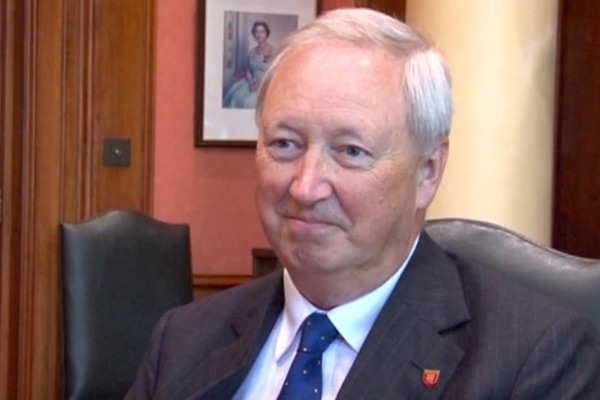

A US convict who racked up $12million in fake fees has been allowed to open a bank account in Jersey after convincing the Bailiff that it would not be used for the proceeds of crime.
The man, a former Securities industry worker who has not been named, had wanted to pay a cheque for over £200,000 in compensation from an infamous 90s Ponzi scheme into a trust, including a Montana ranch and a share in a London and New York-based talent agency, set up for the benefit of his family.
But the difficulty was that he was unable to open a bank account in order to cash the cheque because of a prior conviction.
In what the Bailiff, Sir William Bailhache, described as “unusual circumstances”, he therefore turned to Jersey’s Royal Court.

Pictured: The Bailiff, Sir William Bailhache, heard the case alone in the Royal Court.
As the Bailiff noted, what he was seeking was not the court’s “approval for some momentous decision”, but “practical help.”
The Court heard that the man’s conviction centred on a “misdemeanour” committed in New York in 2009. Following an investigation by the city’s Attorney General and the US Securities and Exchange Commission, it emerged that the man had gained “at least $12million in sham finders fees or placement agent fees in respect of investments into the New York State Pension Fund.”
Despite the large sum of money involved, he was reported to have cooperated with the authorities and reached an agreement with them. In the end, it was decided that he would pay the money back over a period of three years and be barred from working in the Securities Industry again.
Having now repaid the money and having no further related claims against him, the man was nonetheless still in the difficult position of being unable to find banking facilities to cash a cheque for £211,379.27 in compensation from a victim fund set up to help those who had been stung by jailed fraudster and former stockbroker Bernard Madoff’s infamous Ponzi scheme.

Pictured: The settlor of the trust had a previous conviction in New York.
The cheque was due to cover losses sustained by the trust, as it had invested over $1million into an investment fund, which had itself invested into the Madoff scheme.
The Bailiff verified the original source of this wealth, learning that it had stemmed from commissions for services provided by the man in setting up a number of funds. He commented that there was “no indication that the commissions paid were tainted in any way.”
Negotiations were subsequently carried out with a Jersey bank – referred to only as the ‘X bank’ in the Bailiff’s judgment – over September and October, with it later agreeing to accept the money into an account.
However, a bank representative held firm that while they were “pleased to support on this occasion, it does not set precedent that we will be obligated in any way to accept any future funds for this structure.”
Reflecting on his position within the rare case, the Bailiff noted that it had brought “into sharp focus competing legal principles.”
“On the one hand, the provision of banking facilities to particular customers is a matter of choice for the bank in question, subject to any regulatory direction which may lawfully be given pursuant to the banking licence which has been issued. Understandably for both reputational and practical reasons, banks and other financial service institutions are reluctant to receive tainted funds, and sometimes indeed are reluctant to grant facilities to those who have been convicted of criminal offences. This, of course, can cause real difficulty because the banking system is central to the international community’s business, and to the ordinary lives of citizens everywhere,” he noted.
However, he claimed that there didn’t “seem to be any doubt at all about the integrity of the proposed account holder”, a Jersey-registered trust company. While noting the settlor of the trust’s previous conviction in New York, the Bailiff also gave assurance that the bank would not have any “direct dealings” with him.
He added that he was satisfied the Madoff cheque didn’t relate to “tainted funds”, explaining: “What seems to me to be of particular importance in this respect is that it is obvious that the Madoff cheque represents compensation payable to the trustee as a victim of fraud, and not as the perpetrator of any fraud or other criminal offence. It would be really quite surprising if no bank were willing to assist a victim in the recovery of monies due to it. Furthermore, in this particular case, no cheques to victims are being paid out, as we are informed, without the sanction of the Department of Justice in the United States.
“One assumes that the need for that sanction arises because the Department of Justice are themselves concerned to ensure that the victims’ fund is not used to reward criminals. It is not unreasonable to conclude that the Department of Justice must have reached the view that there is nothing tainted about these monies, not just the monies that have been paid out of course, but the original investment into the Madoff Scheme in the first place. Had there been any question about the bona fides of that investment, one cannot think that the Department of Justice would have authorised the issue of the Madoff cheque.”
Having satisfied himself that the account wouldn’t be accepting the proceeds of crime, he ordered that the Jersey trust company open an account for the trust in order to cash the cheque.
Comments
Comments on this story express the views of the commentator only, not Bailiwick Publishing. We are unable to guarantee the accuracy of any of those comments.